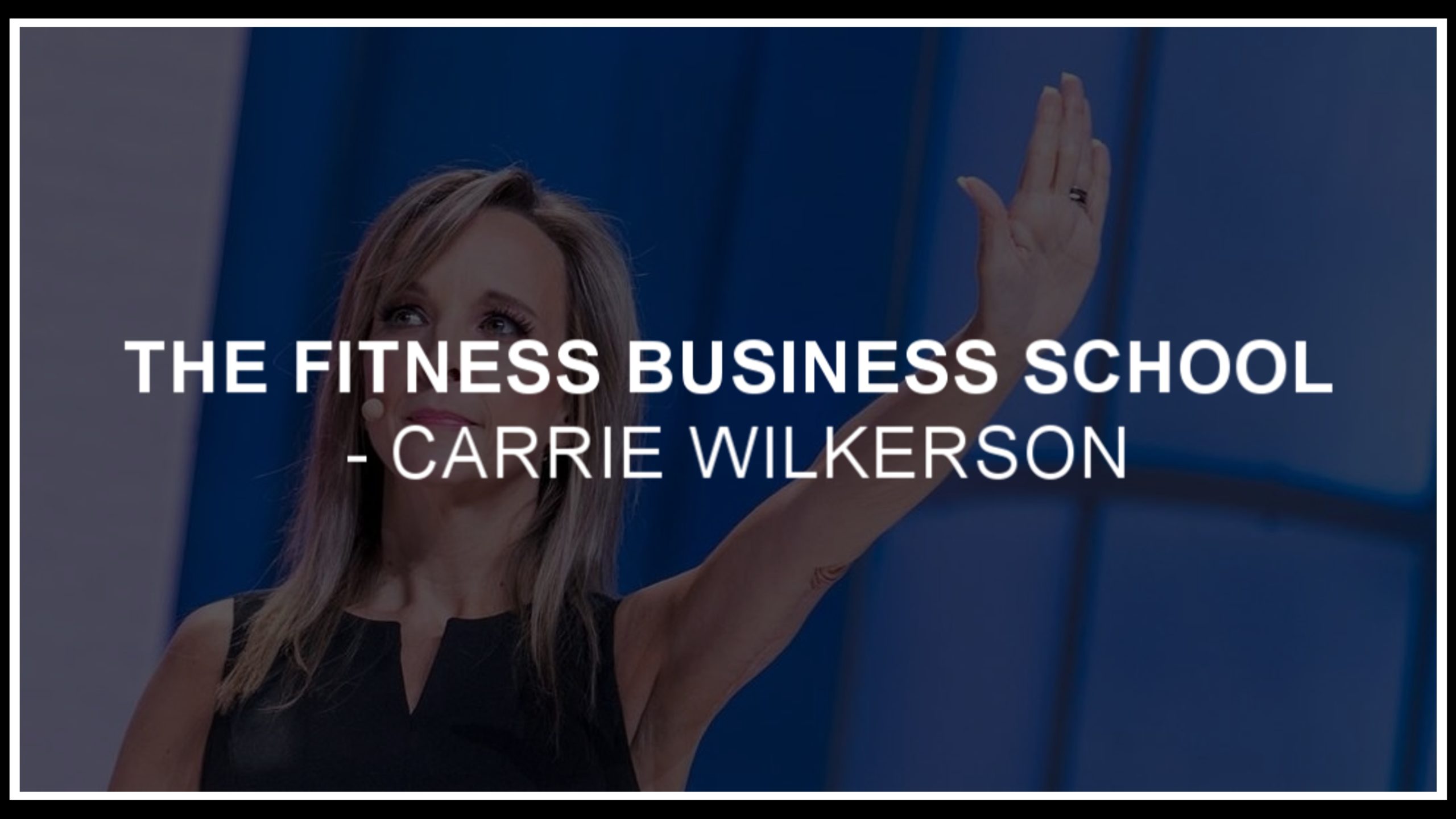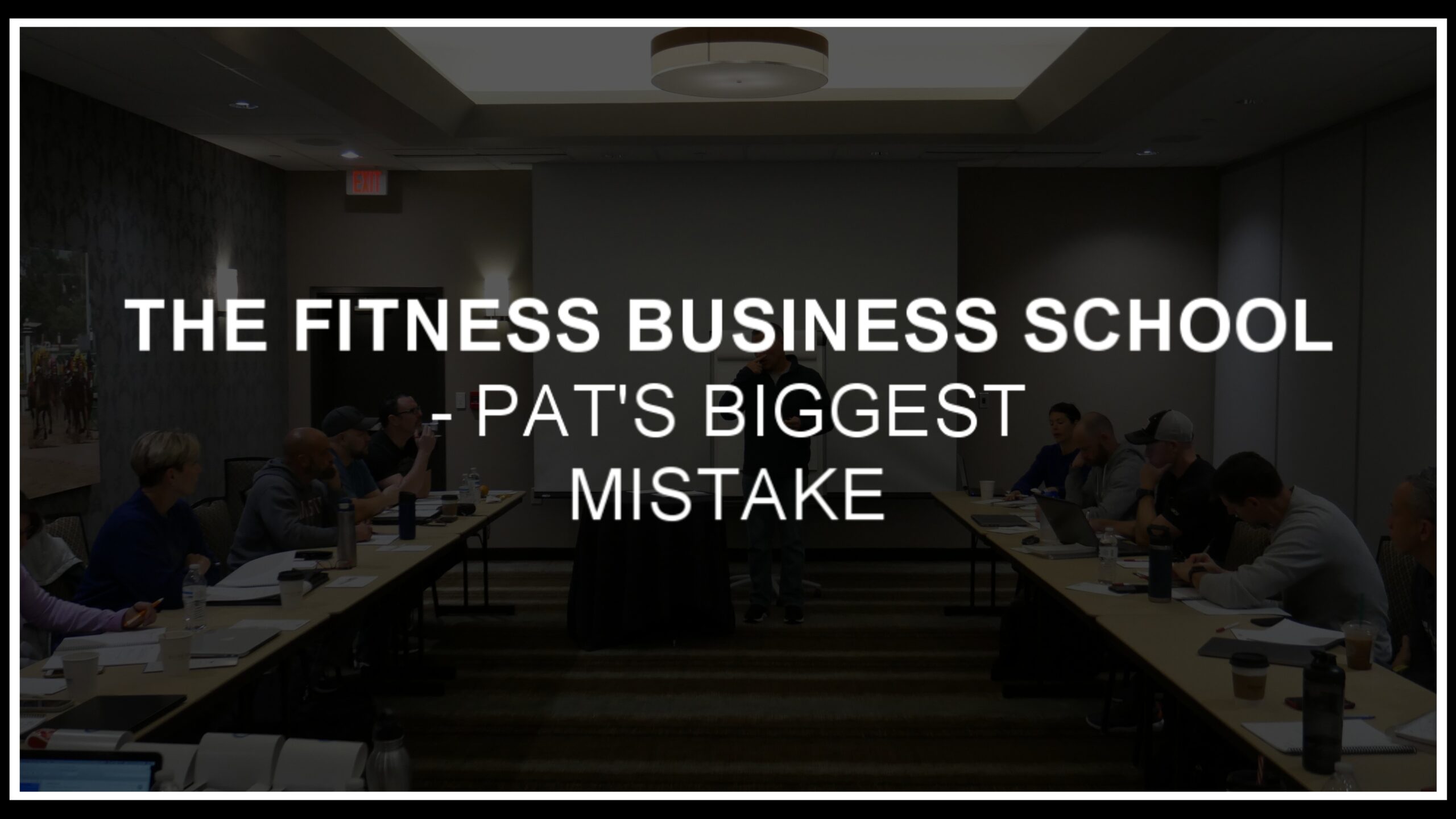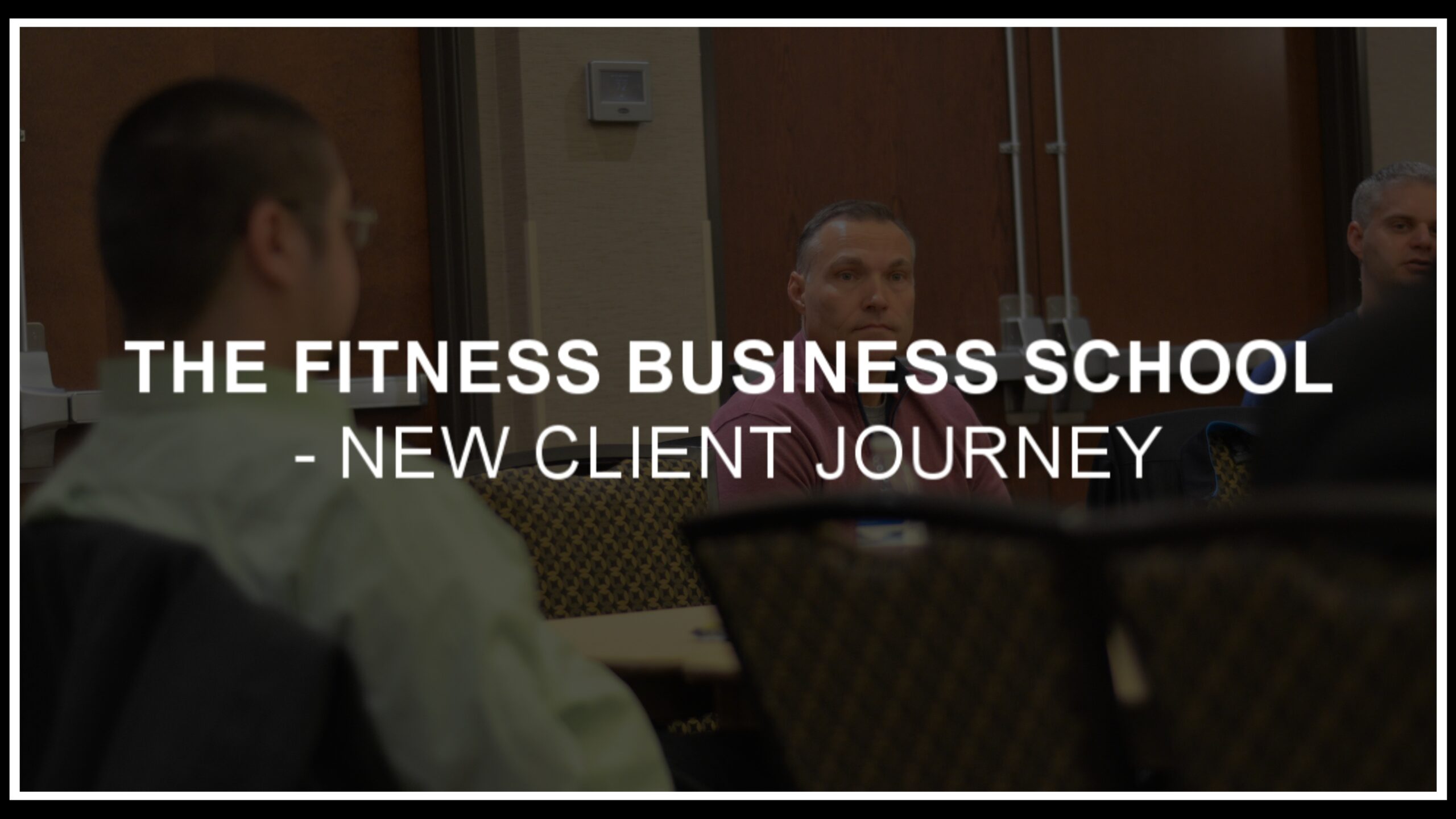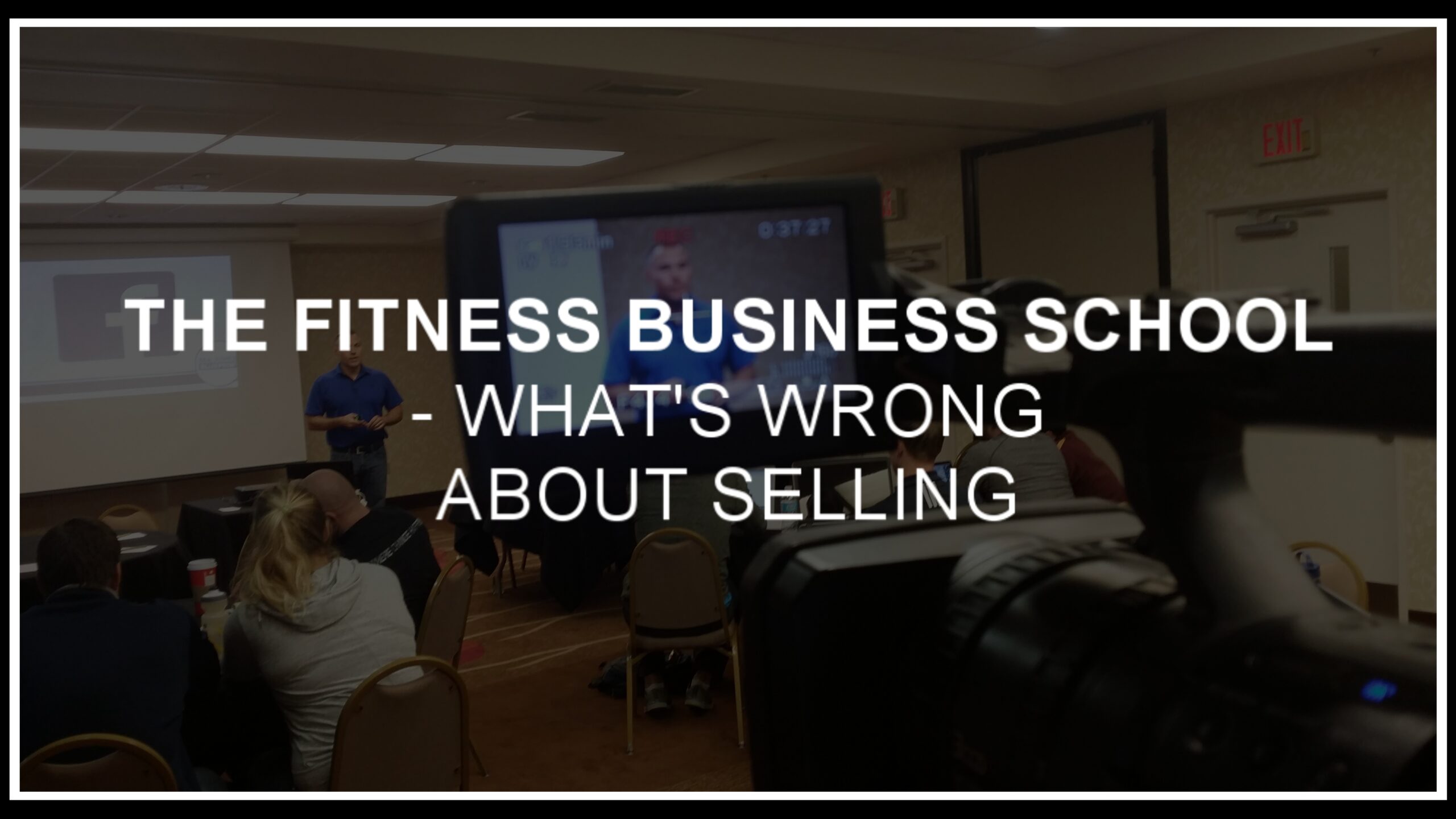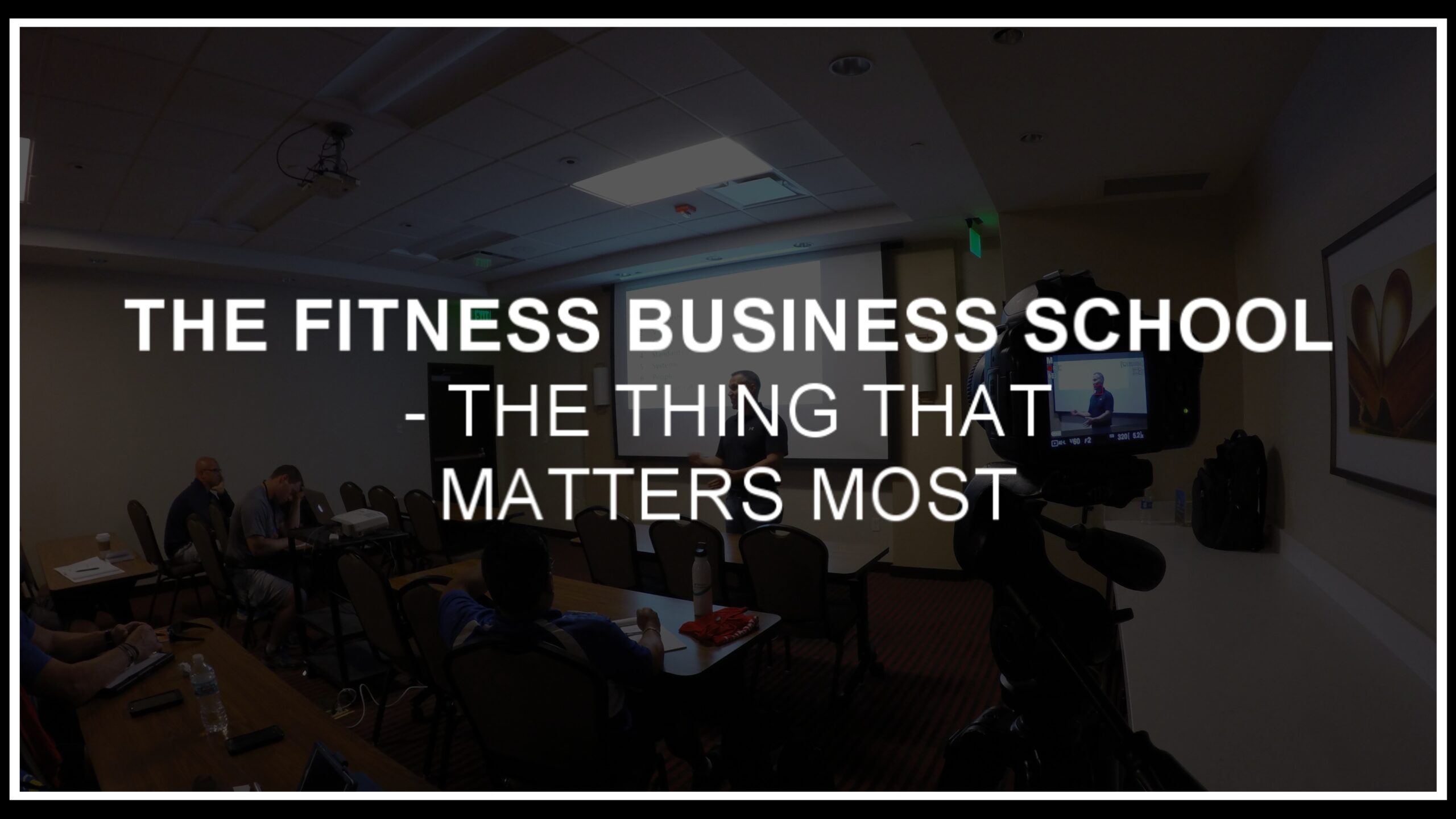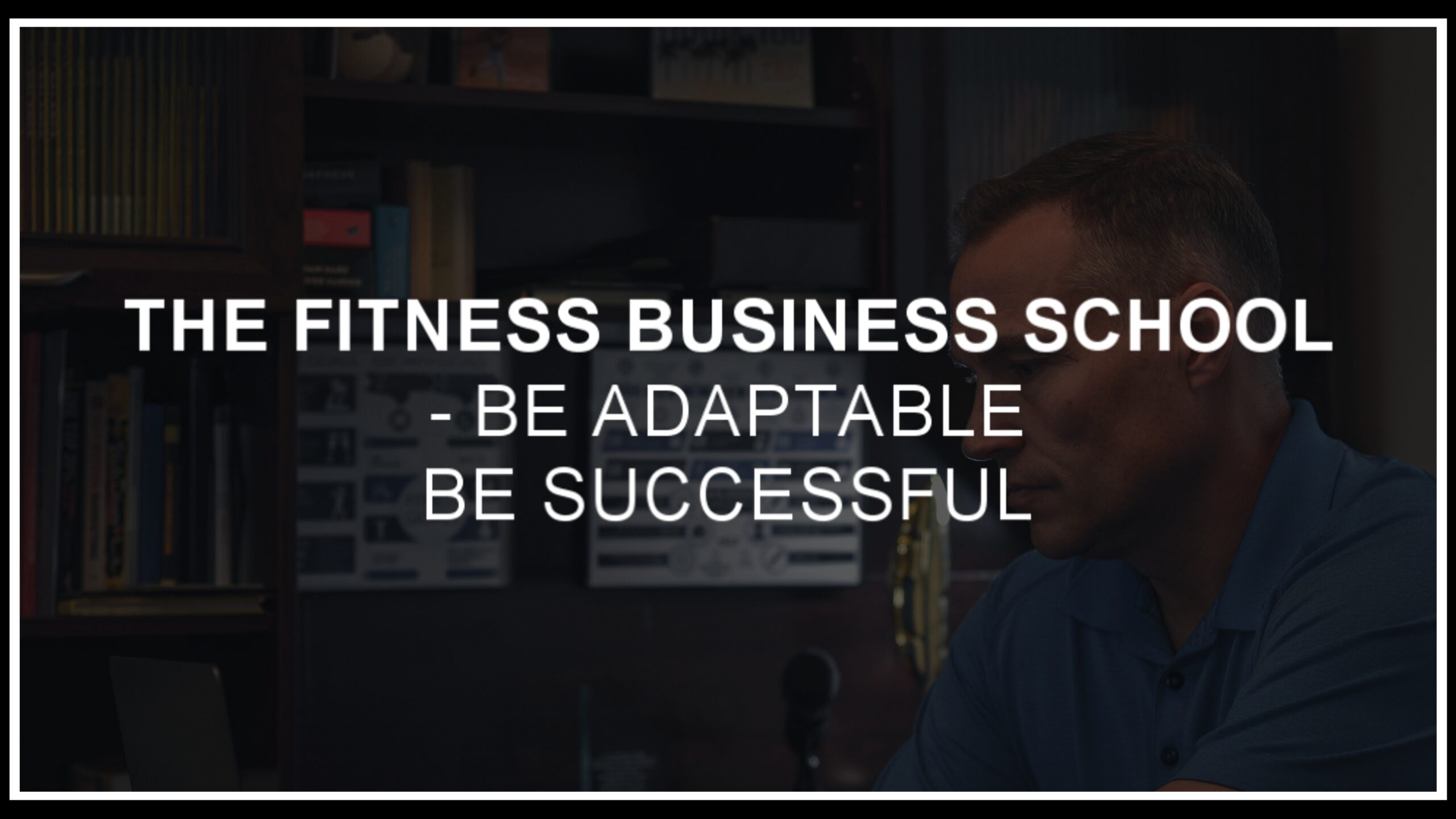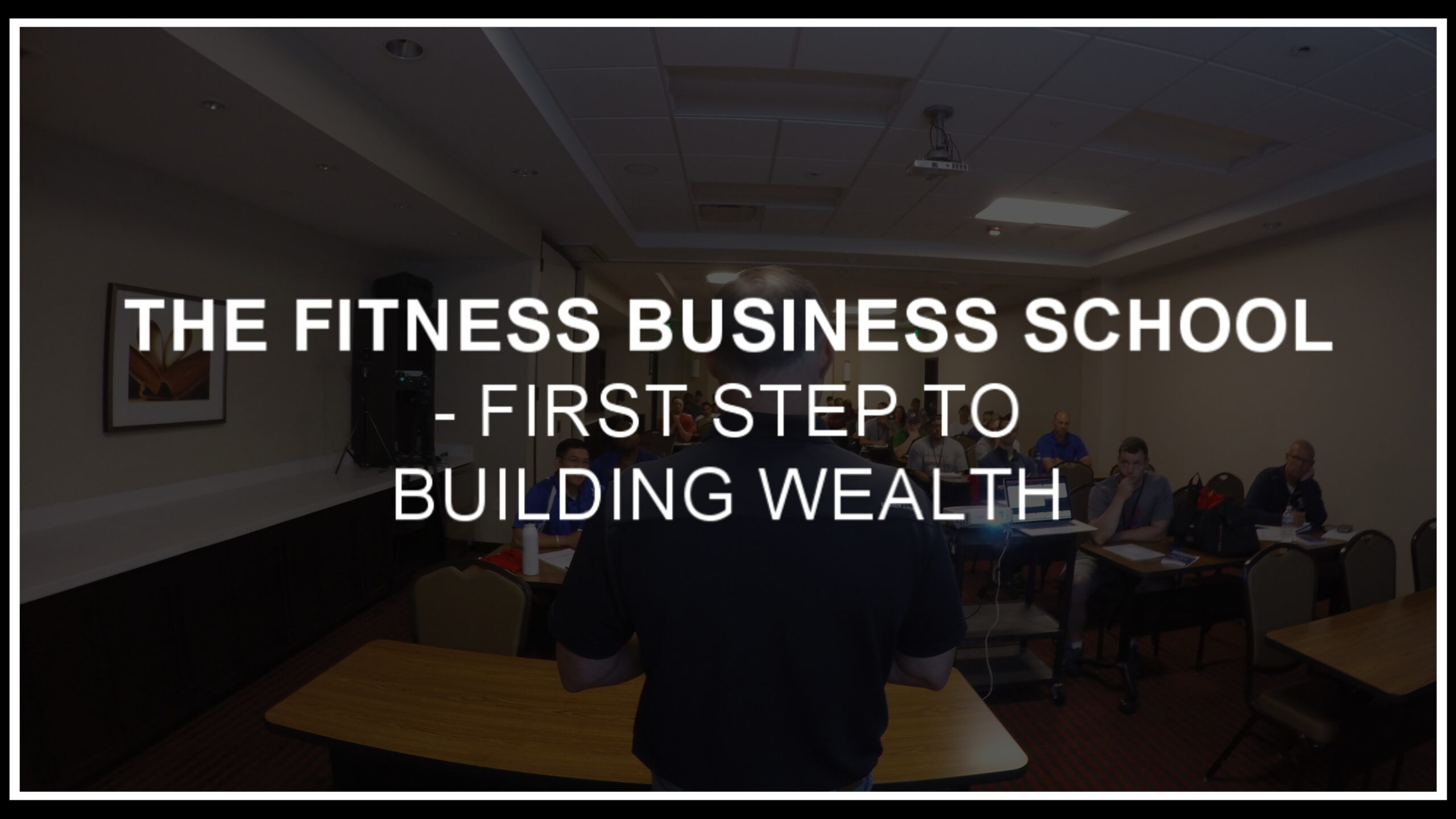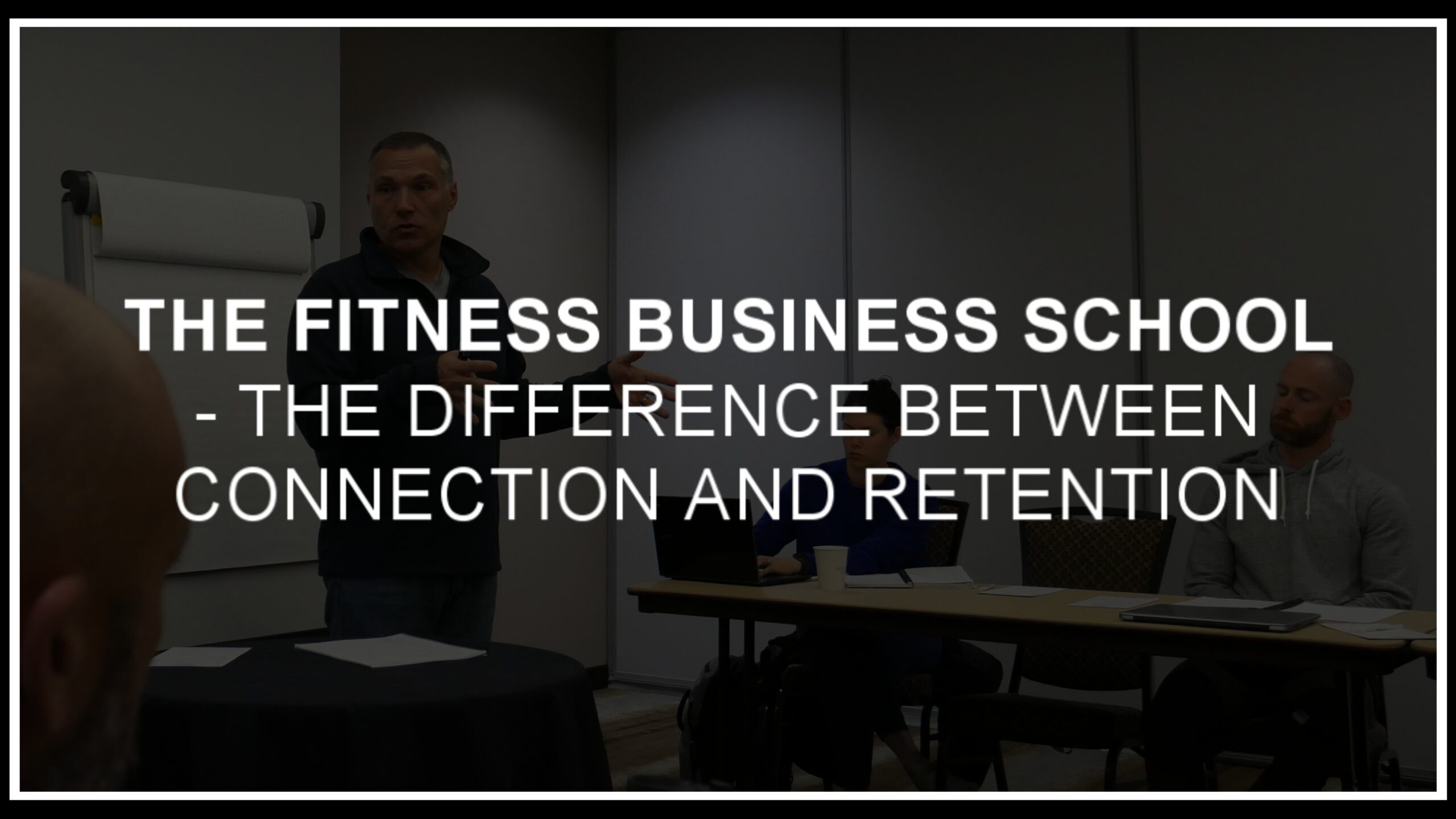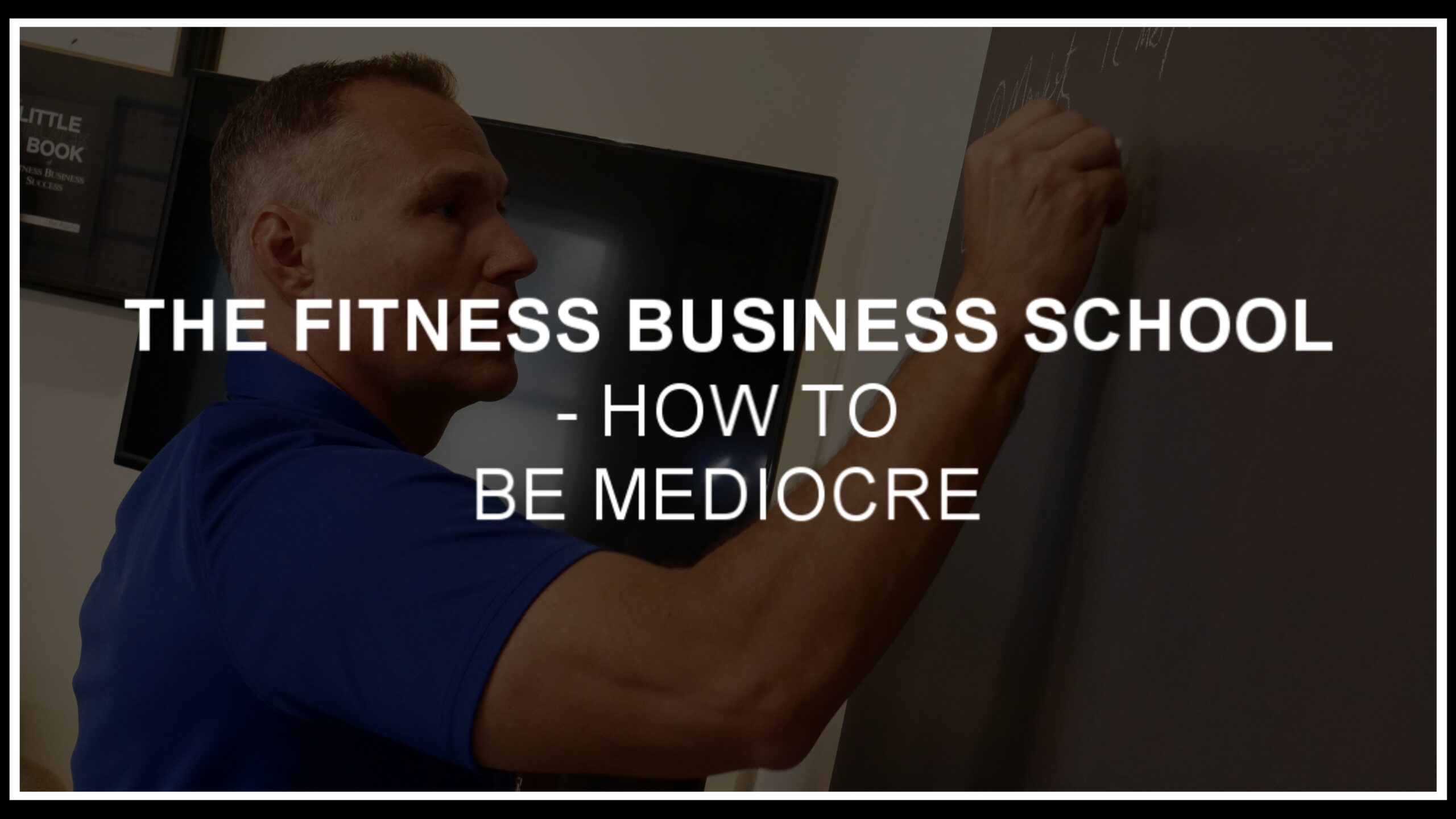P.S. – 6-Weeks of Coaching…Free.
Get a surge of new clients and revenue over the next 6 Weeks with ZERO FEE and no obligation to continue?
If you’re a current business owner who wants to add 50K or more in annual revenue over the next 12 month, you can Test Drive our coaching program for 6 Weeks with no fee or even an obligation to continue as a way to demonstrate how we can help you grow your business.
No strings attached. No obligation. You get our best coaching & tools…and hopefully, you’ll love it enough that you want to keep working together.
Would you be interested in discussing?
If so, email me here with ‘interested’ in subject line and we’ll set up a chat.
Full Transcript
Hey everyone Pat Rigsby here with today’s episode of the fitness business school. And I have my great friend, the illustrious Carrie Wilkerson.
Welcome to the fitness business school podcast. The show for fitness business owners who want to grow their income, increase their end impact and improve their lifestyle. Be sure to listen to the end of this episode, because we have a brand new special offer exclusive for listeners. So stay tuned.
For those of you who don’t know Carrie, because she is not necessarily a fitness industry person. Carrie is essentially a legend in the coaching business leadership bestselling author landscape keynote speaker. We could probably spend the rest of this episode just giving her intro, but for our purposes, Carrie has served as not only a great friend for the past 15 years or so to both myself and a Holly, but also as a mentor and influence somebody who kinda led by example as well even wrote the forward to my book, the ideal business formula. So really excited to share with you guys, maybe kind of a pull back the curtain type of episode because Carrie and I get together and talk every week, but now you guys are gonna listen in and maybe this is the, the, the PC version of it, but you guys get to listen in to our weekly chat. So welcome Carrie. Thanks. I’m gonna have you write my next bio. I got illustrious and legendary and so many nice things. I’m gonna have to strip all that and put it in my, on my, about me page, Have at it, take, take it and we can even augment it if you want. So man, we’ve we’ve gone back for years and years and years met on Twitter, met on Twitter, a mutual friend introduced us. And then we met in person at Disney world because we both tweeted that we were there at the same time and we, Which seems very risky these days.
I would not do that now. I wouldn’t do it now, but it worked at that point. You and your kids and me and ours. And we met in the middle of the street at Disney world. And and the rest, as they say is history. Yeah. So for, for anybody listening in, they probably know my affection for, for, for Disney world Disneyland, all things Disney. So see plenty of, of good things come out of that. It’s not just, Hey, we’re gonna go ride rides and eat too much. So exactly. So I, I want, you know, I’ve got a handful of questions I want to ask you because I think that part of the, the thing that has probably kept us connected and sharing ideas and best practices so long is this, this idea of wanting to build a really family friendly business and do things the right way. And so I’ve got all sorts of directions. We may go with that, but before we get into that, we probably need to ask you to tell your backstory a little bit as to how you got into the, the world of coaching and helping people build businesses and all that fun stuff. Yeah, I never would’ve said I was gonna be a bus business person. I was a music person and I didn’t have a big idea. I didn’t have any big goals around business, but when we fostered to adopt a sibling group two siblings in the late nineties everything changed. And I decided that I wanted to be at home with them. They had kind of a rough start, rough backstory. And so I decided to walk away from teaching. I was teaching high school. At that time, I had worked in the government sector. I had worked in the public sector. I had done a whole lot of things, but I decided to walk away from that, but we still needed the money.
So I said, you know, I have a degree, I have some skills. I think this internet might have some possibilities to connect people at home. What can I do just to make up the income gap? So I did not start because of a big passion or a want to change the world or influence people. I really just needed to make up a gap in our cash flow. And so that’s where we started. And as we built that and grew that business, it evolved a little more to where other people, because we were kind of pioneers in the industry at that point, late nineties at that point, people were saying, what are you doing and how are you doing it? And how are you guys home and, and what’s happening. So I started teaching and turns out that, you know, I can tell a story to the point that people listened. So I started getting asked to do public speaking again, my goal was never to be a public speaker. I’ve been told to shush almost my whole life as a matter of fact. So to get paid to speak was really, really very surreal. And and then you and I met on Twitter and right around the same time, Thomas Nelson, who is now Harper Collins approached me about writing a book because of content I was sharing in social media and the brand that I was building then called the barefoot executive about working at home on your terms. We then added two more kids for a total of four.
I my husband took a middle retirement’s what I call it. He stayed home for 12 years. He worked for my business and par actively parented the kids from home. They were all home with him until the youngest was in first grade. And he went back to work in an office to finish out his stint there. But that’s why I started what I did that it didn’t start with a big idea. It didn’t start with any big plan. It didn’t start with any big goals. I literally just needed to make up a gap in what we needed to make because of me walking away from my teaching income. Wow. I, I feel like I can relate a lot to that leaving the, a university setting and going and trying to figure things out. And it goes pretty well. So other people wanna know what you’re doing. Sounds kind of familiar, go figure. Yep. So coaching that we’ve done coaching because we’ve done not because we’ve got a coaching certification. Yes. It, it, I, I think that kinda leads to the, maybe the next, the, the next topic or next thing that I’d like to discuss is so you, you did things, you, you had success and so other people started to gravitate to you wanna learn what you’re doing.
So what I, I think what would be maybe some, some things that you felt like helped you have that initial success that parlayed itself into becoming somebody who could teach others? Yeah. I would say that my first business, while I was good at it, I was in sales. I was good at it, but I was not great at the money management or the managing of people in that particular business. So I evolved three years later into a different model of service business and an agency, which was a much better fit for me. And then I hired somebody to manage my people, but my strength was always in the marketing and the speaking to sell and in the innovation of products and, and filling a need. So I think what, what led to the success of that one was really staying in my lane, my sweet spot, knowing who specifically my market was nationwide. My market was only 10,000 people big. And so I served 1800 of those on a monthly basis. That business is still in the operation, by the way I sold it, but it’s still going I served 1800 of them on a monthly basis on a subscription level with one core product. And we did multiple, multiple millions of dollars with that. So what I learned is that a niche is important that your market doesn’t have to be big, but you do need to have focus and work with excellence in what you do work to mastery, to what you do at that point. Also, I was studying scale and how to increase capacity for my team without adding hours. So we kind of pioneered the remote work from home industry. I had a virtual team across the country before you ever heard of virtual teams. Some of those people, I still haven’t met and I started that business 20 years ago. The so we paid them on a per client basis. We rewarded them for speed instead of paying by the hour. We did our marketing based largely on a referral basis. I started studying some online marketing techniques, some internet marketing strategies, like automatic payment and subscription billing and auto responders and delivering things through servers instead of his attachments to emails. And that led me to the information space so that when people started asking me, how are you doing this? I didn’t have to do a lot of phone calls. I created information courses and or products.
So one really evolved into the other learning how to maximize and work my core business in a more smart and streamlined way, led me into other avenues of being able to teach and deliver. And that’s when people started really paying attention and asking because I was one of the first women in the space, honestly, and there was really nothing spectacular about what I was doing. It was just different. And we were doing it well to the tunes, to the tune of a lot of money. I mean, two executive incomes in the same household from dialup internet. So that’s, that’s where the authority and credibility came from. I think it came from the consistency, the, you know, the early onset and the fact that we were just in mastery, we were just doing what we said we were gonna do. We were not jumping around from thing to thing. And we could show proof of concept of what we were doing. We weren’t just regurgitating what we heard everybody else saying There, you know, there there’s so much that, that I, that I love about that because a its applicable, whether somebody’s talking about online, they’re talking about offline a, a, a hybrid style business focus, do a great job, more opportunities come actually building on a solid foundation, which, you know, I, I would probably hypothesize has led to your longevity in the profession when at 98% of people tend to maybe enter with a bang, but exit pretty quickly with A fizzle. Yes. And, and, you know, not thinking that you have to have the, the biggest possible market. I mean, you know, I, when you said, Hey, there’s a, a nationwide market of 10,000 people or even a global market.
I don’t remember the exact parameters, but like, you know, that’s a small town. Somebody can build a wonderful business in a small town by doing things the right way, keeping the blinders on doing great work and it just kind of multiplies. So no, that, that’s great. So one thing that, that I first knew of you with that, I think also probably you know, led to a lot of your success, or at least from an observational standpoint, seeing that way. I, I knew of you on Twitter very much as a connector, you were the person who were, was continually introducing people to other people and essentially creating new relationships, adding value to relationships without really asking for things. And I know that, you know, some people feel like, you know, networking is so ancient or antiquated, but, you know, we teach a lot of that in, in our coaching. And at least from my perspective, that was what I first recognized you as was like, Hey, you know what, Carrie knows, everybody carries out here helping everybody. And that was kinda my warm introduction. Yeah. I, I probably would be classified maybe as a super connector and rarely do I ask for something in return and rarely would I have to because reciprocity or whatever you know, some people will just offer or just normally think of me, or if I do ask they’re more than happy to help because I’ve helped so much in the past. But I think giving without expectation and connecting smart people, I like to consider people in the family, like once I really embrace people or, and they’re in my network or in my family, and I know what they’re good for and what I can trust them about, then I wanna trust my other people with them too. So I like to keep the money in the family. I like to keep the referrals in the family.
You know, I think I sent us screenshot recently of a coaching session. I was in where somebody said, oh, you know, your buddy, Pat Rigsby, I wanna know how he does X, Y, Z. And so I, I love that people know that I know early on, I even saw that I thought it would probably benefit my kids for me to build my network that I didn’t, I wasn’t trying to build my network so I could be on some famous talk show or so I could have some fame, but I thought, you know, if one or two of these people is really useful for my kids down the road, helping them learn something or get a, a backstage pass to something literally in, in our world then that might be helpful. And I’ll tell you what, my college kid, my third one, she said the other day mom, I just love that. You’re so connected because it just helps my name drop. And my references, every time I go into an interview somewhere and I said, listen, that’s, that’s part of the capital that we have. That’s, that’s part of the wealth that we have is the relationships that we’ve been built. And we don’t do that to name drop. And pat, I know you and I are very aligned on this. We don’t do that to name drop. I don’t care if you’re impressed by who I know I care if who I, I care if who I know can help you. I care if who you know, can help who I know. So the relationships that you and I have built, including each other is, is what has kept us in business this long. We have not used those relationships to step over people. We know people in the industry and we could name them. And you guys would know who we were talking about. People that have just leveraged names and relationships, as long as they were useful to them. And then they never look back. But pat and I aren’t that way, we literally have real relationships and serve each other and find ways to connect with each other. And as a matter of fact, we do, we meet weekly now just to chat and connect and learn from each other and see who we can refer to each other. And at least once a month, I’ll say, Hey, pat, I know this person that’s struggling with X, Y, Z. Would you mind having a conversation with them? Or would you mind dropping them an idea or a resource or whatever? And I just think relationship capital is not, it’s not old school. It’s only school. It’s, it’s not traditional or classical. It’s just classy and necessary. And people are tired of being Autosonders people really wanna be connected and know people. So that’s, that’s why I connect people. I connect people because when I got online, it was because I felt very alone working at home, and I wanted other people not to feel like they were all by themselves. So I purposed very early on to connect smart people with other smart people and helpful people and useful people. The the, the funny thing that, that I’m kind of thinking about right now is we, you know, we kind of referenced meeting on Twitter. And actually before we jumped on this podcast you were commenting on a thread about Twitter and I, I made mention of it. And, and I think both of us have, you know, made, made good use of the various platforms that were available to us. Online and offline, you know, various channels have, have helped you grow your business. They’ve helped me grow mine. But the recurring theme or the re you know, the kind of common thread that has lasted throughout has been so much of that relationship building stuff. So much of connecting and valuing relationships and having longevity. I, I actually was talking with our mutual friend, pat beef yesterday, and he said he had a, a picture pop up or a memory pop up or something of a mastermind. You guys ran, you know, YX mastermind from 2000.
Yeah. So you know, to be able to, you know, create those relationships and sustain them over time, you know, I mean, I think so many people fall in love with tactics, or they fall in love with a platform and they, they missed the mark. Yeah. Twitter may have been how you and I originally connected, but that was just the point of connection after that, it became a relationship that, Hey, you’re going to have to maintain that and foster that. And, you know, you know, really kind of build on that. And, and it’s not platform specific. And hopefully the people checking this episode out are embracing that because yeah, I mean, they can use Instagram right now. Maybe they can parlay Facebook groups into new clients, but at some point then we move past the platform and into the relationship. Yeah, exactly. And now we have spoken at each other’s events. We’ve had our masterminds meet at the same places at the same time so that we could collaborate there. We’ve coached each other. We have met at several other industry events partially, so we can make snarky comments at dinner later about what we would’ve done differently. But, but yeah, relationship takes work. And I think that’s why a lot of people in business don’t wanna do it.
They would rather be transactional and figure churn and figure conversions and all those things and relationships supposedly don’t scale, supposedly. I think you and I would beg to differ. I think we’ve scaled them nicely. And at the same time we met a lot of people. I met a lot of people that same time I met pat that I do not still have relationship with for one reason or another. And then I met people around that same time that I could pick up and text or call, you know, at any given time. And they would do anything or show up or speak or whatever that happens to be. So I think relationships can scale you can’t automate them, but you can scale them for sure. And they’re the only capital that matters honestly. Well, so you’ve been able to kind of evolve your business over time. You, you obviously have made various, I, I, I guess the, the common word would be pivots along the way. Everything from speaking in front of tens of thousands of people and turning that into consulting on the, the back end to running smaller, intimate masterminds info products, what do you all right. So the, the first question I would have with all that is not, what’s different about all of those things, but what, what has kind of been common threads throughout all of those things? Hmm. That’s a good question. I think the common thread from all that, well, first, I would say don’t be distracted by the fact that that pat just mentioned several things. I didn’t start several things at once. I did one thing to either mastery or exhaustion before I picked up another thing. My service based business, when it did really, really well, that’s when I hired a general manager to replicate me, duplicate me. And so I could build something else, which was the barefoot executive online. So I could step out of that. I didn’t chase two rabbits at the same time I would mask, I would catch one and turn it over to somebody else before I chased another one. I think the common thread for me has always been ironically mass communication, which is funny because that’s my degree.
However, it wasn’t really a degree. I pursued, I was a music major up until my last semester. And then I was so burned out on school and so tired and married and distracted and ready to focus on something else that it’s the degree I could get fastest. I lacked 27 hours and I took 27 hours over the fall to finish. Isn’t that insane? 27 hours. You guys, 12 is full time. 12 and 15 is full time. I had to have special permission from the Dean. It was all related to mass communications and I finished, but I fell in love with the thought of speaking one time and having it go to many. So I really kind of thought I might be in radio, or I thought I might be you know, public relations or something like that. And then I went into teaching because I was just so wired for practical and for job, I went into teaching communications, but I did the yearbook and the newspaper. So we had to generate our own budget. We had to generate our own sales. And that’s when I discovered marketing and business. And also digital media. We had a digital lab before anybody else in town, did we? It was, it was really like all of those things were coming together at one time. So I would say the common thread is building relationships. If we’re gonna go back to the words we used earlier, building relationships and communicating on a bigger scale, rather than one to one, recognizing the power of using media, whether it’s typed platform like a blog or a radio platform, but really leveraging the power of technology to communicate something that I feel really strongly about or serving others through mass communication, nobody’s ever asked me that before.
So I’ve never really thought through that, but if I had to just pick it like son Tamson Webster calls that the red thread that tends to run through your work, if I had to pick it, I would say, I love to be able to mobilize large groups of people and share with them what I’m either passionate about or something I think that will help them in a more efficient, effective way. Hmm. Way. Nice. Here we go. We’re just making it up as we go along kids. Well, that’s the idea, right? Hey, this, this was the plan. It was, Hey, let’s just have a conversation. Yeah. Yeah. Interesting. So you not unlike I’m, I’m sure most of the people listening to this, you know, you had one, one business that was operating a certain way that was reliant largely on some live face to face interaction going into 2020. You were going around doing lots of keynote keynote talks and and, and your business was really both thriving, but focused on that. I mean, I remember that so well, and then that all of a sudden had to change kind of in an instant and move to more virtual setting and probably even change in that the people probably didn’t have budgets to do a lot of that same stuff. So were there any valuable lessons you took away from having to pivot?
Not only in the method of delivery, but even some in the, the market? All of it. Yeah. A, a pivot because of evolution is so much different than a panic pivot and 2020 didn’t give us a choice. We had, we had to pivot hard and fast. I had four years been doing online coaching and consulting and info products and had made a really strategic and calculated decision to go just to keynotes because that’s what I was loving. And that’s where my energy was coming from, was specializing in big events and high energy keynotes. So I had purged my email list to a very small focused list. I had stopped most of my products and coaching programs, and I was just keynoting. Well, our business started to change even before 2020, because a lot of events that had international clients started getting nervous about COVID even before January. So we started seeing some things postpone or cancel as early as December in January or not schedule, you know, they’re saying well, we really wanna do an event in April, but we’re really not sure. So not only did all the speakers business stop and go income zero, but many of them went income negative. And here’s why, because they had collected deposits. Most of us collect half of it in advance just to secure the date.
So I had many, many friends that had to return up to six figures in deposits and multiple six figures in deposits, depending on how much of their year that they had booked. And if you don’t plan well, I mean, you know, they’re living on that money. Like everybody lives on their business money. I had friends that literally had to take second mortgages on their house and in order to refund events, it was a really hard time for the industry. And because a lot of people don’t consider it a essential industry. You know, there was not a lot of sympathy for the speaker world or the live event world or, and, and those of us like you and I that have masterminds or live events as a way to funnel our business. We had to cancel those two and we lost hotel contracts and we had to fight, you know, for some of those deposits and things. So it was tough. It was really, really tough at the same time. I had two teenage daughters at home having a really rough time because of COVID. One of them is a performing artist.
So her whole world had just come crashing down and dealing with mental health issues at the same time as I’m, you know, approaching, approaching 50 and you know, pre-menopause, all of it at the same time caused a big panic pivot. And I’ll just be honest that I was ready to be done. I was ready to be done. I was in my late forties and I was tired and I was burnout. And I didn’t wanna start over again. I was really and, and that’s part of the danger when you have something like a pandemic that doesn’t have a end date. Recessions can be that way too, but I really was fatigued. Now, looking back, I can tell that some of it was biochemical. Some of it was biology. Some of it was a lot of it was circumstantial and societal, but it, but it’s real. And when we are in business for ourselves, so we have to recognize all those components that come into play. So I had to take a good, hard look at what I wanted to be doing, what was working, what wasn’t working. And then the other side of that coin was yeah, I could have defaulted into full-time coaching, online business owners. Like I had done before, except that many of them were frozen in fear or really cash strapped or feeling apathetic or frozen dealing with kids at home. We were all in the same boat. So it was it was difficult. It was really difficult. And we just kind of had to take a step back and say, what do we want, what do we not want? What do we need, what do we have to have? What do we need to figure out? And if we’re gonna build something new from scratch, what does that need to look like? I did do some virtual keynotes. I don’t love them. Part of what I love about a big event is the energy. I don’t love all the travel associated with it, but I do love a big event because of the energy and the audience interaction.
So virtual wasn’t the same, but I got to do some of that. I got to really lead my audience in a different way. I, I went online for every day of what we thought would be the shutdown. I think we did 35 to 40 days of alive every single day, no matter what the emotion was. I, I really encouraged them to dress every day. I encouraged them to get outside a little bit every day to show up in their business a little bit every day. So, I mean, I, I forced myself to, to keep leading and to keep working and doing but I’m not gonna lie. It was rough and it was hard. And what I learned from that is number one, always have more of a cushion than you think you need. Number two be prepared for the UN comparable. I mean, would I have done anything different going back? I don’t know, because I really was serving in a sweet spot and speaking and in demand and, and feeling like I was using my gifts where I was supposed to use ’em at that point. I wish I had recognized earlier on that I was also being affected so strongly by biology and brain chemistry. That was really hard. All of that at the same time was really very difficult. But what that’s enabled me to do now is recognize it in other people, I probably have five conversations a week with people that are in their late forties, early fifties, that are dealing with the same kind of apathy or feeling irrelevant or dealing with a funk of some sort. And the first thing I tell ’em is let’s talk about your biology. Let’s talk about your brain chemistry. And then we could talk about business because cellularly, you’re not the same human that you were before. So, you know, I can’t necessarily just address it from a pivot point because there were just was so much going on, but I would encourage anybody listening that when you feel like a different human, sometimes it’s because you’re a different human and you might need to go talk to some professionals about either some counseling or some brain chemistry, or just addressing what’s going on in your body. We just can’t expect the same things out of our body now that we expected 15 years ago and 30 years ago, we’re just not the same as we were, even if we’re in shape, we’re not the same as we were by design. So Some of that you didn’t even know. So you got more than you than you bargained for there. That was a, a, a fun segue to what I wanted the, the, the kind of closing topic to be was. Okay. So you are almost exactly the same age as me just yeah, two months In the day.
Yep. And you know, I, I know it is, you know, I’m thinking about, Hey, what am I excited about for the next chapter of my professional life, personal life? So what are you excited about for the, you know, the, the next chapter of your professional life, what what’s got you energized and optimistic and hopeful. That’s a good question. I listened to a Ted talk a few weeks ago by Ben Zander. He’s the author, coauthor of the art of possibility, and he’s a conductor. He also has a school for symphonies and things, and we’re a family of musicians. So I really, it really resonated with me, but he said that it just hit him one time as he stepped off the stage that people had come to hear the music and applauded for the performers and wanted to listen to these great masterpieces, but he’s the one getting the credit. And not only was his back to the audience the whole time, but he had never touched an instrument that he was in a conductor season, right. He had spent his whole life on mastery and performing and writing and all those things. But he was in a conductor season where he was really pulling the best out of other people. And that really hit me. And I thought, huh, maybe at this stage, that’s where I am. Maybe, maybe that’s where I’m stepping to next is.
And yes, I will be back on stages. But with the end goal of pulling the best out of other people, I’ve never had a brand where I wanted people to be like me. I’ve never been statusy, that’s one thing I love about you and Holly too. It’s never about the house or the cars or the whatever. It’s about the time with our kids. It’s about the opportunities for our family. It’s about the it’s the being able to serve other people. And so I think maybe I’m stepping into a conductor phase where I’m enabling other business owners to pull the best out of themselves. And maybe it’s okay that my back is to the audience. And maybe it’s okay that I’m not touching an instrument at this point. Maybe all those years of instrument mastery and study leads to this, whether that’s in my next book or the next keynote or whatever deep thoughts, What a fun answer. That’s good. And that’s a great book too. So, And I love his Ted talk. It’s one of my very favorite Ted talks. Very good. Very good. Well, man, we’ve probably quadrupled the typical length of my podcast. Exactly. So, yeah, but we’re probably still about 30 minutes short of our normal chat chat. We always go late, no matter what time, but I’m gonna turn the tables on you. What are you excited about Mr. Almost as old as me? What are you excited about in the second half? You know, I, I think I am having a lot of fun trying to think about ways to be better and just fine tune things instead of chase new things, always it’s how do I improve the things that I’m doing, improve the relationships that I have kind of be, be where my feet are, so to speak. I know my, my best buddy Jeff was fond of that phrase. And I think that’s, that’s a good one. And it, yeah, I, I think the idea of, okay, how can we really help?
You know, I I’ve talked at length about building the ideal business as a vehicle to have the type of life you want. You know, really making you know, making it my professional purpose to, to help people do that. Not necessarily, you know, Hey, achieve this revenue mark or attract this many clients. I mean, those may be vehicles to the destination, but they aren’t the destination. So yeah, I’m, I’m really excited about that. Just being you know, being focused on having that type of impact. Love it. I love it. Your dad would approve, you’re focused on working on things under the hood instead of buying the new vehicle. Ah, there you go. A fun, a fun mechanic reference since you get to check out what probably is the best conference of all for that sort of thing, right? Yeah. That’ll be my next couple of days. Maybe we’ll do a future episode on what this Southern girl has. No idea about cars learned at this auto worker’s conference. , that’s a, that’s a whole other issue, But you know, that’s probably and it definitely merits another podcast, but you just to, to give you, you guys, some insight, Carrie is going and checking out somebody who’s in the mastermind group that, that I’m in a really, really high performing business owner leader who works in kind of the automotive re re repair space to see how he’s built this world class culture, where, you know, he’s got incredible retention with no contracts. He’s got maybe as good a, of an allegiance of the people that, that he serves that anybody could.
Yes. And so she went and got under the hood, so to speak, to see how all this works, I’m going into reverse engineer. I think if you can’t learn from other industries you’re missing out, you’re absolutely missing out. I believe that’s some of the best learning is when you can draw some parallels and connect some dots from other places. So that’s what I’m gonna be doing the next couple of days. Wow. And man, and these are long days, eight to 8:00 AM to 10:00 PM and they keep them together for lunch. I mean, they Sure. Like it’s insulated bubbled. It’s like, there is no cut and loose. So I know, I know. Yes. Well, oh, we’ll thank you for spending our weekly chat recording studio, so to speak. And maybe we’ll, we’ll do a follow up and see what kind of fun things you learned at, at this event and, and much more so thanks for hanging out. Yep.
Thanks for listening to this episode of The Fitness Business School. Before you go, I have a quick announcement. When I first connect with a fitness business owners, they almost always asked me, how can I get more clients or make more money? Well, I have an exclusive offer for you, and it’s gonna help you do just that. As a listener of this show, you can test drive our business growth accelerator coaching program for FREE.
BGA is a one of a kind program where you get done-for-you marketing tools and a level of coaching that is unmatched in our industry to help you attract more qualified prospects and convert them into paying clients, ultimately making you more revenue and personal income.
Imagine having every tool template ads, script you need all proven to convert in, ready to use. Plus you have access to over 10 weekly live video coaching sessions to help you with everything from dialing in your ads, to mastering your mindset. You get all of this and more when you joined BGA and to help you succeed, I’m going to do something I’ve never done before. I’m going to let you test drive BGA at zero cost.
If it delivers for you in the way that I expect – it more than it pays for itself, and you’ll probably want to stay. If not, you’re out nothing and have a library of proven tools and resources to keep.
To take advantage of this special offer. Just email me [email protected] and put test drive in the subject line, and I’ll get you all the details.

